Carlee Joe-Wong
Federate the Router: Learning Language Model Routers with Sparse and Decentralized Evaluations
Jan 29, 2026Abstract:Large language models (LLMs) are increasingly accessed as remotely hosted services by edge and enterprise clients that cannot run frontier models locally. Since models vary widely in capability and price, routing queries to models that balance quality and inference cost is essential. Existing router approaches assume access to centralized query-model evaluation data. However, these data are often fragmented across clients, such as end users and organizations, and are privacy-sensitive, which makes centralizing data infeasible. Additionally, per-client router training is ineffective since local evaluation data is limited and covers only a restricted query distribution and a biased subset of model evaluations. We introduce the first federated framework for LLM routing, enabling clients to learn a shared routing policy from local offline query-model evaluation data. Our framework supports both parametric multilayer perceptron router and nonparametric K-means router under heterogeneous client query distributions and non-uniform model coverage. Across two benchmarks, federated collaboration improves the accuracy-cost frontier over client-local routers, both via increased effective model coverage and better query generalization. Our theoretical results also validate that federated training reduces routing suboptimality.
GLUE: Gradient-free Learning to Unify Experts
Dec 27, 2025Abstract:In many deployed systems (multilingual ASR, cross-hospital imaging, region-specific perception), multiple pretrained specialist models coexist. Yet, new target domains often require domain expansion: a generalized model that performs well beyond any single specialist's domain. Given such a new target domain, prior works seek a single strong initialization prior for the model parameters by first blending expert models to initialize a target model. However, heuristic blending -- using coefficients based on data size or proxy metrics -- often yields lower target-domain test accuracy, and learning the coefficients on the target loss typically requires computationally-expensive full backpropagation through the network. We propose GLUE, Gradient-free Learning To Unify Experts, which initializes the target model as a convex combination of fixed experts, learning the mixture coefficients of this combination via a gradient-free two-point (SPSA) update that requires only two forward passes per step. Across experiments on three datasets and three network architectures, GLUE produces a single prior that can be fine-tuned effectively to outperform baselines. GLUE improves test accuracy by up to 8.5% over data-size weighting and by up to 9.1% over proxy-metric selection. GLUE either outperforms backpropagation-based full-gradient mixing or matches its performance within 1.4%.
M3Net: A Multi-Metric Mixture of Experts Network Digital Twin with Graph Neural Networks
Dec 10, 2025Abstract:The rise of 5G/6G network technologies promises to enable applications like autonomous vehicles and virtual reality, resulting in a significant increase in connected devices and necessarily complicating network management. Even worse, these applications often have strict, yet heterogeneous, performance requirements across metrics like latency and reliability. Much recent work has thus focused on developing the ability to predict network performance. However, traditional methods for network modeling, like discrete event simulators and emulation, often fail to balance accuracy and scalability. Network Digital Twins (NDTs), augmented by machine learning, present a viable solution by creating virtual replicas of physical networks for real- time simulation and analysis. State-of-the-art models, however, fall short of full-fledged NDTs, as they often focus only on a single performance metric or simulated network data. We introduce M3Net, a Multi-Metric Mixture-of-experts (MoE) NDT that uses a graph neural network architecture to estimate multiple performance metrics from an expanded set of network state data in a range of scenarios. We show that M3Net significantly enhances the accuracy of flow delay predictions by reducing the MAPE (Mean Absolute Percentage Error) from 20.06% to 17.39%, while also achieving 66.47% and 78.7% accuracy on jitter and packets dropped for each flow
DR. WELL: Dynamic Reasoning and Learning with Symbolic World Model for Embodied LLM-Based Multi-Agent Collaboration
Nov 06, 2025



Abstract:Cooperative multi-agent planning requires agents to make joint decisions with partial information and limited communication. Coordination at the trajectory level often fails, as small deviations in timing or movement cascade into conflicts. Symbolic planning mitigates this challenge by raising the level of abstraction and providing a minimal vocabulary of actions that enable synchronization and collective progress. We present DR. WELL, a decentralized neurosymbolic framework for cooperative multi-agent planning. Cooperation unfolds through a two-phase negotiation protocol: agents first propose candidate roles with reasoning and then commit to a joint allocation under consensus and environment constraints. After commitment, each agent independently generates and executes a symbolic plan for its role without revealing detailed trajectories. Plans are grounded in execution outcomes via a shared world model that encodes the current state and is updated as agents act. By reasoning over symbolic plans rather than raw trajectories, DR. WELL avoids brittle step-level alignment and enables higher-level operations that are reusable, synchronizable, and interpretable. Experiments on cooperative block-push tasks show that agents adapt across episodes, with the dynamic world model capturing reusable patterns and improving task completion rates and efficiency. Experiments on cooperative block-push tasks show that our dynamic world model improves task completion and efficiency through negotiation and self-refinement, trading a time overhead for evolving, more efficient collaboration strategies.
Offline Clustering of Preference Learning with Active-data Augmentation
Oct 30, 2025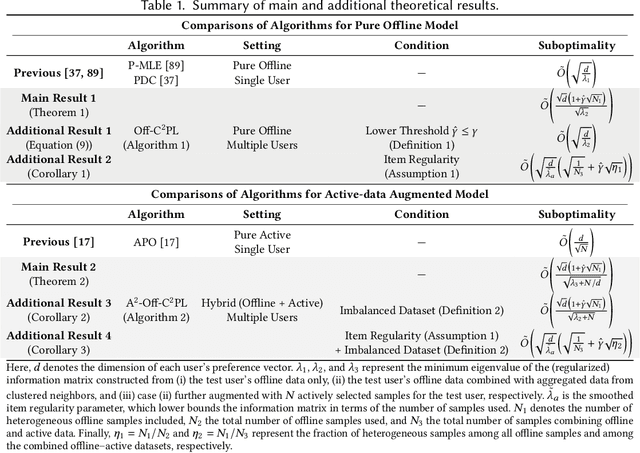
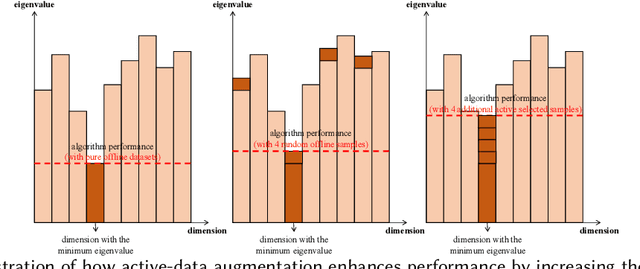

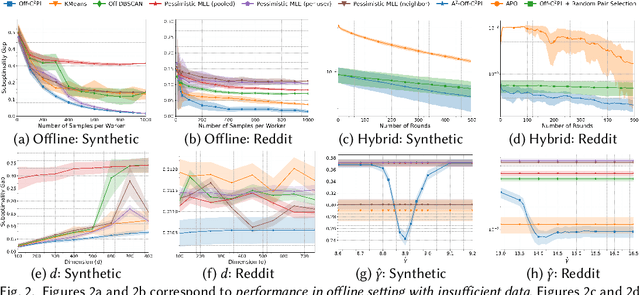
Abstract:Preference learning from pairwise feedback is a widely adopted framework in applications such as reinforcement learning with human feedback and recommendations. In many practical settings, however, user interactions are limited or costly, making offline preference learning necessary. Moreover, real-world preference learning often involves users with different preferences. For example, annotators from different backgrounds may rank the same responses differently. This setting presents two central challenges: (1) identifying similarity across users to effectively aggregate data, especially under scenarios where offline data is imbalanced across dimensions, and (2) handling the imbalanced offline data where some preference dimensions are underrepresented. To address these challenges, we study the Offline Clustering of Preference Learning problem, where the learner has access to fixed datasets from multiple users with potentially different preferences and aims to maximize utility for a test user. To tackle the first challenge, we first propose Off-C$^2$PL for the pure offline setting, where the learner relies solely on offline data. Our theoretical analysis provides a suboptimality bound that explicitly captures the tradeoff between sample noise and bias. To address the second challenge of inbalanced data, we extend our framework to the setting with active-data augmentation where the learner is allowed to select a limited number of additional active-data for the test user based on the cluster structure learned by Off-C$^2$PL. In this setting, our second algorithm, A$^2$-Off-C$^2$PL, actively selects samples that target the least-informative dimensions of the test user's preference. We prove that these actively collected samples contribute more effectively than offline ones. Finally, we validate our theoretical results through simulations on synthetic and real-world datasets.
Neural Bandit Based Optimal LLM Selection for a Pipeline of Tasks
Aug 13, 2025Abstract:With the increasing popularity of large language models (LLMs) for a variety of tasks, there has been a growing interest in strategies that can predict which out of a set of LLMs will yield a successful answer at low cost. This problem promises to become more and more relevant as providers like Microsoft allow users to easily create custom LLM "assistants" specialized to particular types of queries. However, some tasks (i.e., queries) may be too specialized and difficult for a single LLM to handle alone. These applications often benefit from breaking down the task into smaller subtasks, each of which can then be executed by a LLM expected to perform well on that specific subtask. For example, in extracting a diagnosis from medical records, one can first select an LLM to summarize the record, select another to validate the summary, and then select another, possibly different, LLM to extract the diagnosis from the summarized record. Unlike existing LLM selection or routing algorithms, this setting requires that we select a sequence of LLMs, with the output of each LLM feeding into the next and potentially influencing its success. Thus, unlike single LLM selection, the quality of each subtask's output directly affects the inputs, and hence the cost and success rate, of downstream LLMs, creating complex performance dependencies that must be learned and accounted for during selection. We propose a neural contextual bandit-based algorithm that trains neural networks that model LLM success on each subtask in an online manner, thus learning to guide the LLM selections for the different subtasks, even in the absence of historical LLM performance data. Experiments on telecommunications question answering and medical diagnosis prediction datasets illustrate the effectiveness of our proposed approach compared to other LLM selection algorithms.
Semantic Caching for Low-Cost LLM Serving: From Offline Learning to Online Adaptation
Aug 12, 2025Abstract:Large Language Models (LLMs) are revolutionizing how users interact with information systems, yet their high inference cost poses serious scalability and sustainability challenges. Caching inference responses, allowing them to be retrieved without another forward pass through the LLM, has emerged as one possible solution. Traditional exact-match caching, however, overlooks the semantic similarity between queries, leading to unnecessary recomputation. Semantic caching addresses this by retrieving responses based on semantic similarity, but introduces a fundamentally different cache eviction problem: one must account for mismatch costs between incoming queries and cached responses. Moreover, key system parameters, such as query arrival probabilities and serving costs, are often unknown and must be learned over time. Existing semantic caching methods are largely ad-hoc, lacking theoretical foundations and unable to adapt to real-world uncertainty. In this paper, we present a principled, learning-based framework for semantic cache eviction under unknown query and cost distributions. We formulate both offline optimization and online learning variants of the problem, and develop provably efficient algorithms with state-of-the-art guarantees. We also evaluate our framework on a synthetic dataset, showing that our proposed algorithms perform matching or superior performance compared with baselines.
Evaluating Selective Encryption Against Gradient Inversion Attacks
Aug 06, 2025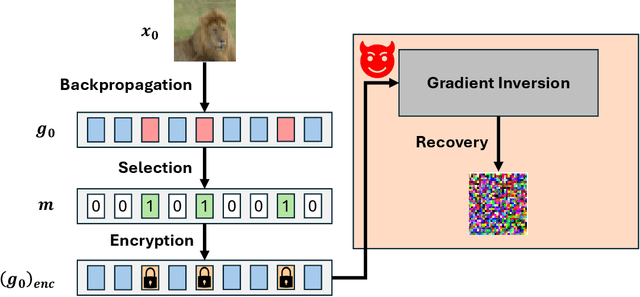

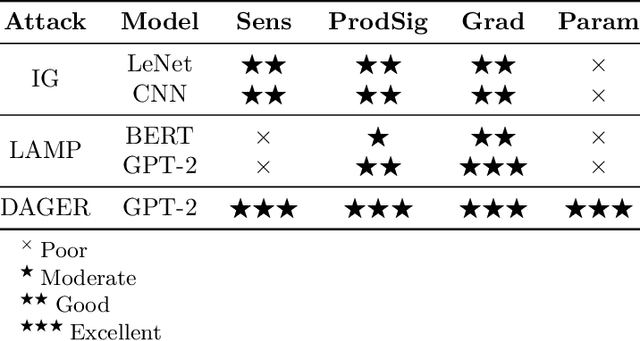

Abstract:Gradient inversion attacks pose significant privacy threats to distributed training frameworks such as federated learning, enabling malicious parties to reconstruct sensitive local training data from gradient communications between clients and an aggregation server during the aggregation process. While traditional encryption-based defenses, such as homomorphic encryption, offer strong privacy guarantees without compromising model utility, they often incur prohibitive computational overheads. To mitigate this, selective encryption has emerged as a promising approach, encrypting only a subset of gradient data based on the data's significance under a certain metric. However, there have been few systematic studies on how to specify this metric in practice. This paper systematically evaluates selective encryption methods with different significance metrics against state-of-the-art attacks. Our findings demonstrate the feasibility of selective encryption in reducing computational overhead while maintaining resilience against attacks. We propose a distance-based significance analysis framework that provides theoretical foundations for selecting critical gradient elements for encryption. Through extensive experiments on different model architectures (LeNet, CNN, BERT, GPT-2) and attack types, we identify gradient magnitude as a generally effective metric for protection against optimization-based gradient inversions. However, we also observe that no single selective encryption strategy is universally optimal across all attack scenarios, and we provide guidelines for choosing appropriate strategies for different model architectures and privacy requirements.
Offline Clustering of Linear Bandits: Unlocking the Power of Clusters in Data-Limited Environments
May 25, 2025Abstract:Contextual linear multi-armed bandits are a learning framework for making a sequence of decisions, e.g., advertising recommendations for a sequence of arriving users. Recent works have shown that clustering these users based on the similarity of their learned preferences can significantly accelerate the learning. However, prior work has primarily focused on the online setting, which requires continually collecting user data, ignoring the offline data widely available in many applications. To tackle these limitations, we study the offline clustering of bandits (Off-ClusBand) problem, which studies how to use the offline dataset to learn cluster properties and improve decision-making across multiple users. The key challenge in Off-ClusBand arises from data insufficiency for users: unlike the online case, in the offline case, we have a fixed, limited dataset to work from and thus must determine whether we have enough data to confidently cluster users together. To address this challenge, we propose two algorithms: Off-C$^2$LUB, which we analytically show performs well for arbitrary amounts of user data, and Off-CLUB, which is prone to bias when data is limited but, given sufficient data, matches a theoretical lower bound that we derive for the offline clustered MAB problem. We experimentally validate these results on both real and synthetic datasets.
TACO: Tackling Over-correction in Federated Learning with Tailored Adaptive Correction
Apr 24, 2025Abstract:Non-independent and identically distributed (Non-IID) data across edge clients have long posed significant challenges to federated learning (FL) training in edge computing environments. Prior works have proposed various methods to mitigate this statistical heterogeneity. While these works can achieve good theoretical performance, in this work we provide the first investigation into a hidden over-correction phenomenon brought by the uniform model correction coefficients across clients adopted by existing methods. Such over-correction could degrade model performance and even cause failures in model convergence. To address this, we propose TACO, a novel algorithm that addresses the non-IID nature of clients' data by implementing fine-grained, client-specific gradient correction and model aggregation, steering local models towards a more accurate global optimum. Moreover, we verify that leading FL algorithms generally have better model accuracy in terms of communication rounds rather than wall-clock time, resulting from their extra computation overhead imposed on clients. To enhance the training efficiency, TACO deploys a lightweight model correction and tailored aggregation approach that requires minimum computation overhead and no extra information beyond the synchronized model parameters. To validate TACO's effectiveness, we present the first FL convergence analysis that reveals the root cause of over-correction. Extensive experiments across various datasets confirm TACO's superior and stable performance in practice.
 Add to Chrome
Add to Chrome Add to Firefox
Add to Firefox Add to Edge
Add to Edge